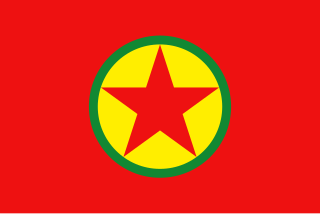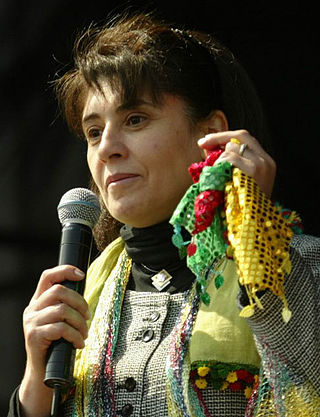
The Kurdistan Workers' Party or PKK is a Kurdish militant political organization and armed guerrilla movement which historically operated throughout Kurdistan but is now primarily based in the mountainous Kurdish-majority regions of southeastern Turkey and northern Iraq. It was founded in Ziyaret, Lice on 27 November 1978 and has been involved in asymmetric warfare in the Kurdish–Turkish conflict. Although the PKK initially sought an independent Kurdish state, in the 1990s its official platform changed to seeking autonomy and increased political and cultural rights for Kurds within Turkey.

Leyla Zana is a Kurdish politician. She was imprisoned for ten years for her political activism, which was deemed by the Turkish courts to be against the unity of the country. She was awarded the 1995 Sakharov Prize by the European Parliament but was unable to collect it until her release in 2004. She was also awarded the Rafto Prize in 1994 after being recognized by the Rafto Foundation for being incarcerated for her peaceful struggle for the human rights of the Kurdish people in Turkey and the neighbouring countries.
The Democratic People's Party was a pro-Kurdish political party in Turkey.

The Democratic Society Party was a Kurdish nationalist political party in Turkey. The party considered itself social-democratic and had observer status in the Socialist International. It was considered to be the successor of the Democratic People's Party (DEHAP). The party was established in 2005 and succeeded in getting elected more than ninety mayors in the municipal elections of 2009. On 11 December 2009, the Constitutional Court of Turkey banned the DTP, ruling that the party has become "focal point of activities against the indivisible unity of the state, the country and the nation". The ban has been widely criticized both by groups within Turkey and by several international organizations. The party was succeeded by the Peace and Democracy Party.
Abdurrahman Yalçınkaya is a high-ranking Turkish judge and the former Chief Public Prosecutor of the Supreme Court of Appeals of Turkey. Since the end of his term on 2011, he has been a member of the Supreme Court of Appeals' Eight Civil Department.

Osman Baydemir is a Kurdish politician, lawyer and human rights activist. He was the mayor of his home town of Diyarbakır from 2004 to 2014. He was a member of the Grand National Assembly of Turkey for the Peace and Democracy Party (BDP) and also the Peoples Democratic Party (HDP).

General elections were held in Turkey on 22 July 2007 to elect 550 members to the Grand National Assembly. Originally scheduled for November, the elections were brought forward after parliament failed to elect a new president to replace Ahmet Necdet Sezer. The result was a resounding victory for the incumbent Justice and Development Party (AKP), which won 46.6% of the vote and 341 seats. The party's leader Recep Tayyip Erdoğan was consequently re-elected as Prime Minister of Turkey. The opposition Republican People's Party (CHP) came second with 20.9% of the vote and took 112 seats. The Nationalist Movement Party (MHP), which had failed to surpass the 10% election threshold in the 2002 election, re-entered parliament with 14.3% of the vote and 71 MPs. The election was fought mostly on Turkey's debate over laïcité that had been perceived to be under threat from the AKP's nomination of Foreign Minister Abdullah Gül, an Islamist politician, for the Presidency. Developments in Iraq, secular and religious concerns, the intervention of the military in political issues, European Union membership negotiations, the United States and the Muslim world were other main issues.

Ahmet Türk is a Kurdish politician from the Peoples' Equality and Democracy Party. He has been a member of the Grand National Assembly of Turkey for several terms and was elected thrice as the Mayor of Mardin.
Ayla Akat Ata is a Kurdish–Turkish jurist and former member of the Grand National Assembly of Turkey of the Peace and Democracy Party (BDP). She is a women's rights activist and the co-founder of the Free Women's Congress (KJA). Besides she was also involved in the negotiations between the Kurdistan Workers' Party (PKK) and the Turkish Government in 2013.

Selahattin Demirtaş is a Turkish politician and author of Kurdish origin. He was the co-leader of the left-wing pro-Kurdish Peoples' Democratic Party (HDP), serving alongside Figen Yüksekdağ from 2014 to 2018. Selahattin Demirtaş announced that he left politics after the May 2023 elections.
The word serhildan describes several Kurdish protests and uprisings since the 1990s that used the slogan "Êdî Bese" ("Enough") against Türkiye. Local shops are often closed on the day of demonstrations as a form of protest.
The 2011–2012 Kurdish protests in Turkey were protests in Turkey, led by the Peace and Democracy Party (BDP), against restrictions of Kurdish rights by of the country's Kurdish minority's rights. Although they were the latest in a long series of protest actions by Kurds in Turkey, they were strongly influenced by the concurrent popular protests throughout the Middle East and North Africa, and the Turkish publication Hürriyet Daily News has suggested that the popularly dubbed "Arab Spring" that has seen revolutions in Egypt and Tunisia may lead to a "Kurdish Summer" in the northern reaches of the Middle East. Protesters have taken to the streets both in Istanbul and in southeast Turkey, with some demonstrations also reported as far west in Anatolia as İzmir.
The Kurdistan Democratic Solution Party or PÇDK, is an illegal political party active in Iraq's Kurdistan Region, founded in 2002. It is part of the Kurdistan Communities Union (KCK), along with the larger Kurdistan Workers' Party (PKK).

Selma Irmak, is a Kurdish politician from Turkey and former MP for the Peace and Democracy Party (BDP) and People's Democratic Party (HDP).
The Ceylanpınar incident saw the killing of two policemen in Ceylanpınar, Turkey, which led to the resumption of the Kurdish-Turkish conflict. The attack was used by the Justice and Development Party (AKP) government as a casus belli to end the 2013-2015 solution process and resume its war against the Kurdistan Workers' Party (PKK). As the AKP had failed to win a majority in the June 2015 Turkish general election the month before, and soon after the resuming hostilities announced the November 2015 Turkish snap general election, analysts believe that the Ceylanpınar killings and return to war have been used to increase Turkish nationalist fervor and favored the ruling party taking back control over the Turkish parliament. Other motives have also been advanced, with the Syrian war encouraging extremist parties from both sides to undermine peace efforts by increasing nationalism and readiness for war.
The Kurdistan Workers' Party (PKK) announced a ceasefire on the 13 April 2009, declaring they would only retaliate in self-defense. The ceasefire was encouraged by the electoral success of the Democratic Society Party (DTP) in the municipal elections of 2009. Then in May 2009, the president of the Kurdistan Communities Union (KCK) Murat Karayilan released a statement supportive of an eventual peace process. Later, the PKK prolonged the ceasefire on the 1 June until the 15 July 2009. On the 15 July the DTP organized a manifestation in support of a peace process which was attended by tens of thousands of people in Diyarbakir, and the PKK again prolonged their ceasefire until the 1 September 2009. The Human Rights Association (IHD), Freedom and Solidarity Party and the Labour Party also supported a potential peace process.
The closure case of the Democratic Society Party (DTP) between 2007 and 2009 was against a pro-Kurdish political party in Turkey which was accused of opposing the unity of the country and having links to the Kurdistan Workers' Party (PKK). The case was opened in September 2007 and resulted in the closure of the party in December 2009. The DTP was the 25th political party which was banned in the Turkish Republic since 1962.
Alican Önlü is a politician of the Peoples Democratic Party (HDP) and a member of the Grand National Assembly of Turkey. Throughout his political career he was a politician in a variety of parties such as the Democracy Party (DEP) and the Democratic Society Party (DTP).
On 12 August 2005, Prime Minister of Turkey Recep Tayyip Erdoğan delivered a speech on the subject of the Kurdish issue in Diyarbakır, the largest Kurdish-majority city in Turkey. The speech is characterized by being the most liberal discourse ever at the time conducted by a Turkish head of government on this issue. In the speech, the prime minister conceded that the Turkish state had made mistakes in the past, used the term “the Kurdish question” and vowed to settle it through more democracy, more citizenship law, and more prosperity. The speech was considered "historic" and "groundbreaking" in Turkey. The speech also faced heavy criticism by Turkish commentators and the main opposition party CHP, for putting the unity of Turkey in danger.

The Kurdish Political Movement or the Kurdish Liberation Movement, refers to the movement that seeks to realize the political demands of Kurdish people living in the geocultural region called Kurdistan in the lands of Turkey, Iraq, Syria and Iran, such as education in their native language, self-determination, autonomy or an independent state. In the context of Turkey, this movement is being pursued by democratic means through left-wing ethnic political parties, as well as through PKK affiliated militant groups.








